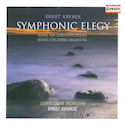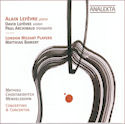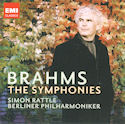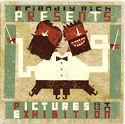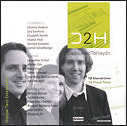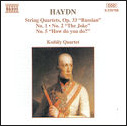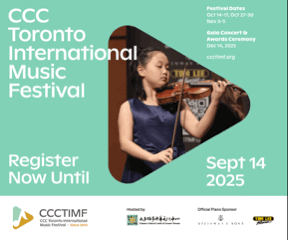DISCoveries - Editors Corner - December 09
Thanks to my day job as general manager of New Music Concerts, it has been my great privilege over the past decade to work with flutist Robert Aitken whenever he is not off on his travels, performing around the globe. Largely due his activities as artistic director of NMC over the past four decades Bob is mostly thought of as a contemporary music specialist here in Toronto, but throughout the rest of the world he is renowned as a performer of music from all eras. Recent activities have included a tour to Hong Kong with harpist Erica Goodman, 10 days of conducting in Slovenia and three weeks of solo and orchestral performances in the Philippines and mainland China. 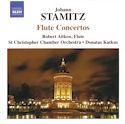 One project that he is particularly proud of is a recording of four flute concertos by Johann Stamitz (1717-1757) which has been released by Naxos(8.570150) just in time for Christmas. The disc was recorded in Vilnius, Lithuania following concert performances with the St. Christopher Chamber Orchestra conducted by Donatas Katkus. We will have an impartial review in our next issue, but I did not want you to have to wait until February to hear about this new disc which I think sounds great. Concert notes: Robert Aitken conducts the NMC ensemble in “Happy Birthday, Udo!” on December 13 at Betty Oliphant Theatre and on January 10 he will receive the prestigious Walter Carsen Prize for Excellence in the Performing Arts at Glenn Gould Studio during NMC’s presentation “Zygmunt Krauze and the Polish Perspective”.
One project that he is particularly proud of is a recording of four flute concertos by Johann Stamitz (1717-1757) which has been released by Naxos(8.570150) just in time for Christmas. The disc was recorded in Vilnius, Lithuania following concert performances with the St. Christopher Chamber Orchestra conducted by Donatas Katkus. We will have an impartial review in our next issue, but I did not want you to have to wait until February to hear about this new disc which I think sounds great. Concert notes: Robert Aitken conducts the NMC ensemble in “Happy Birthday, Udo!” on December 13 at Betty Oliphant Theatre and on January 10 he will receive the prestigious Walter Carsen Prize for Excellence in the Performing Arts at Glenn Gould Studio during NMC’s presentation “Zygmunt Krauze and the Polish Perspective”.
When I dropped by the WholeNote office recently to pick up last minute arrivals there was a bumper crop of discs waiting for me. Here’s a brief mention of those which I found particularly worthy of note.
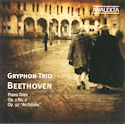 Beethoven Piano Trios Op.1 No.2 and Op.97 “Archduke”– The Gryphon Trio (Analekta AN 2 9858): With the St. Lawrence Quartet having taken up residence in California, the Gryphon Trio can rightfully be called Canada’s pre-eminent chamber group. These two Beethoven trios are personal favourites and receive exhilarating performances here. Although this “Archduke” may not replace as my benchmark the Gilels/Kogan/Rostropovich recording I grew up with, the Gryphons do themselves proud here.
Beethoven Piano Trios Op.1 No.2 and Op.97 “Archduke”– The Gryphon Trio (Analekta AN 2 9858): With the St. Lawrence Quartet having taken up residence in California, the Gryphon Trio can rightfully be called Canada’s pre-eminent chamber group. These two Beethoven trios are personal favourites and receive exhilarating performances here. Although this “Archduke” may not replace as my benchmark the Gilels/Kogan/Rostropovich recording I grew up with, the Gryphons do themselves proud here.
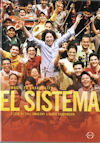 El Sistema – A film by Paul Smaczny & Marta Stootmeir (EuroArts 2056958): This year’s Glenn Gould Prize winner was José Antonio Abreu for his development of El Sistema, the incredibly successful program bringing children to classical music across Venezuela. There are currently 340,000 children, many from disadvantaged families, enrolled in more than a hundred youth orchestras across that country. For those of us not lucky enough to have been in the audience at the Four Seasons Centre last month to hear the jewel in the crown of the program, the Simon Bolivar Youth Orchestra under Gustavo Dudamel and experience the exuberance (and excellence) of these young performers first hand, this DVD documents Abreu’s miraculous achievement.
El Sistema – A film by Paul Smaczny & Marta Stootmeir (EuroArts 2056958): This year’s Glenn Gould Prize winner was José Antonio Abreu for his development of El Sistema, the incredibly successful program bringing children to classical music across Venezuela. There are currently 340,000 children, many from disadvantaged families, enrolled in more than a hundred youth orchestras across that country. For those of us not lucky enough to have been in the audience at the Four Seasons Centre last month to hear the jewel in the crown of the program, the Simon Bolivar Youth Orchestra under Gustavo Dudamel and experience the exuberance (and excellence) of these young performers first hand, this DVD documents Abreu’s miraculous achievement.
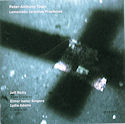 Lamentatio Jeremiae Prophetae – Jeff Reilly; Elmer Iseler Singers; Lydia Adams (ECM New Series 2129): Peter-Anthony Togni’s stunning Jeremiad is a concerto for bass clarinet and mixed choir and it’s great to see it getting international exposure on Manfred Eicher’s adventurous label. This very original work capitalizes on Jeff Reilly’s ability to improvise and uses the bass clarinet as the voice of the beleaguered prophet. The choir is in fine form, with soprano soloist Rebecca Whelan deserving special mention. Recorded in the Cathedral Church of All Saints, Halifax the broad acoustic is well suited to this haunting music. [It is to my ear at moments somewhat reminiscent, but not at all derivative, of Richard Einhorn’s “Voices of Light” created as a soundtrack for the silent film The Passion of Joan of Arc, and Philip Glass’ music for the film Koyannasqatsi. I wonder if there is a film to be found in this music too?]
Lamentatio Jeremiae Prophetae – Jeff Reilly; Elmer Iseler Singers; Lydia Adams (ECM New Series 2129): Peter-Anthony Togni’s stunning Jeremiad is a concerto for bass clarinet and mixed choir and it’s great to see it getting international exposure on Manfred Eicher’s adventurous label. This very original work capitalizes on Jeff Reilly’s ability to improvise and uses the bass clarinet as the voice of the beleaguered prophet. The choir is in fine form, with soprano soloist Rebecca Whelan deserving special mention. Recorded in the Cathedral Church of All Saints, Halifax the broad acoustic is well suited to this haunting music. [It is to my ear at moments somewhat reminiscent, but not at all derivative, of Richard Einhorn’s “Voices of Light” created as a soundtrack for the silent film The Passion of Joan of Arc, and Philip Glass’ music for the film Koyannasqatsi. I wonder if there is a film to be found in this music too?]
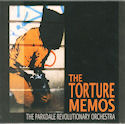 The Torture Memos – The Parkdale Revolutionary Orchestra (www.parkdalerevolutionaryorchestra.com): Composer Ben Mueller-Heaslip uses texts drawn from the writings of John Yoo and his colleagues at the Office of Legal Counsel for the George W. Bush administration for this unusual song cycle. The stark orchestration includes saxophone, violin, cello, bass and drum kit to accompany the declamatory vocals of soprano Kristin Mueller-Heaslip. The result is very effective but hard to define or categorize. The composer sites Schubert, Philip Glass and David Byrne among his influences and the music is as eclectic as might be expected from such diverse roots. Concert note: The Parkdale Revolutionary Orchestra launches “The Torture Memos” at The Tranzac Club on December 11.
The Torture Memos – The Parkdale Revolutionary Orchestra (www.parkdalerevolutionaryorchestra.com): Composer Ben Mueller-Heaslip uses texts drawn from the writings of John Yoo and his colleagues at the Office of Legal Counsel for the George W. Bush administration for this unusual song cycle. The stark orchestration includes saxophone, violin, cello, bass and drum kit to accompany the declamatory vocals of soprano Kristin Mueller-Heaslip. The result is very effective but hard to define or categorize. The composer sites Schubert, Philip Glass and David Byrne among his influences and the music is as eclectic as might be expected from such diverse roots. Concert note: The Parkdale Revolutionary Orchestra launches “The Torture Memos” at The Tranzac Club on December 11.
 TorQ Percussion Quartet (www.torqpercussion.ca): This eponymous CD features improvisations, arrangements and compositions by group members Daniel Morphy, Jamie Drake and Richard Burrows, plus works by Toronto composers Michael Smith, Elisha Denburg and Mark Duggan. There’s lots of lively music here, but moments of contemplation too as in the bell-like sonorities of Duggan’s moving John’s Gone. TorQ was awarded a MARTY for “Best Emerging Performing Arts Group – 2009” by the Mississauga Arts Council and this debut release demonstrates why.
TorQ Percussion Quartet (www.torqpercussion.ca): This eponymous CD features improvisations, arrangements and compositions by group members Daniel Morphy, Jamie Drake and Richard Burrows, plus works by Toronto composers Michael Smith, Elisha Denburg and Mark Duggan. There’s lots of lively music here, but moments of contemplation too as in the bell-like sonorities of Duggan’s moving John’s Gone. TorQ was awarded a MARTY for “Best Emerging Performing Arts Group – 2009” by the Mississauga Arts Council and this debut release demonstrates why.
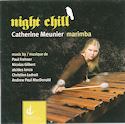 Night Chill – Catherine Meunier (Centrediscs CMCCD 15109): While you might be forgiven for thinking that an hour of banging on the wooden keys of a marimba might be a bit much all at once, there is plenty of contrast here thanks to sound files from Christian Ledroit and Alcides Lanza, Paul Frehner’s second marimba doubling on vibraphone and Nicolas Gilbert’s use of French horn for colour in one of two pieces included here. Like Gilbert, Andrew P. MacDonald contributes two works - The Riff, a lively extended piece for solo marimba and The Illuminations of Gutenberg, a playful marimba duet. Montreal percussionist Catherine Meunier shines throughout.
Night Chill – Catherine Meunier (Centrediscs CMCCD 15109): While you might be forgiven for thinking that an hour of banging on the wooden keys of a marimba might be a bit much all at once, there is plenty of contrast here thanks to sound files from Christian Ledroit and Alcides Lanza, Paul Frehner’s second marimba doubling on vibraphone and Nicolas Gilbert’s use of French horn for colour in one of two pieces included here. Like Gilbert, Andrew P. MacDonald contributes two works - The Riff, a lively extended piece for solo marimba and The Illuminations of Gutenberg, a playful marimba duet. Montreal percussionist Catherine Meunier shines throughout.
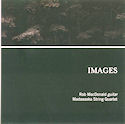 Images, New Music for Guitar and Strings – Rob MacDonald; Madawaska String Quartet (robmac92@hotmail.com): I took a break from writing this column to attend the CD launch of this disc at Gallery 345. This was my first opportunity to hear young guitarist Rob MacDonald and I must say I was very impressed. Very clean articulation, exceptional technique, a strong sense of line and the solo pieces were performed from memory. Like the concert, the CD begins with a very effective set of pieces by Andrew Staniland for solo guitar and concludes with Images, an extended work for guitar and string quartet by American composer Christopher William Pierce. Like Staniland, Pierce did his doctoral studies at the U of T and both are laureates of the Karen Kieser Prize in Canadian Music. Another award winning local composer, Jules Léger Prize laureate Omar Daniel, contributes the dark Nocturne for viola, guitar and cello. Double bassist Peter Pavlovsky joins MacDonald and the members of the Madawaska Quartet for Australian composer Peter Sculthorpe’s lyrical Love Song. Although not mentioned on the disc, a web search indicates that all four pieces are world premiere recordings - well worth seeking out.
Images, New Music for Guitar and Strings – Rob MacDonald; Madawaska String Quartet (robmac92@hotmail.com): I took a break from writing this column to attend the CD launch of this disc at Gallery 345. This was my first opportunity to hear young guitarist Rob MacDonald and I must say I was very impressed. Very clean articulation, exceptional technique, a strong sense of line and the solo pieces were performed from memory. Like the concert, the CD begins with a very effective set of pieces by Andrew Staniland for solo guitar and concludes with Images, an extended work for guitar and string quartet by American composer Christopher William Pierce. Like Staniland, Pierce did his doctoral studies at the U of T and both are laureates of the Karen Kieser Prize in Canadian Music. Another award winning local composer, Jules Léger Prize laureate Omar Daniel, contributes the dark Nocturne for viola, guitar and cello. Double bassist Peter Pavlovsky joins MacDonald and the members of the Madawaska Quartet for Australian composer Peter Sculthorpe’s lyrical Love Song. Although not mentioned on the disc, a web search indicates that all four pieces are world premiere recordings - well worth seeking out.
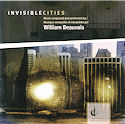 Invisible Cities - music composed and performed by William Beauvais (Centrediscs CMCCD 14809): I have mixed feelings about this disc. Not that it isn’t well performed or well recorded, but simply that it is surprising to hear music with a rhythm section and a “back-beat” – even one so ably provided by George Koller and Alan Hetherington – on the Canadian Music Centre label. These examples – Well Tempered Choros and In Joplin’s Pocket - are just the bookends however and in between there are a number of more “serious” compositions including the Italo Calvino inspired title track for solo guitar. This is a piece I hope to hear live one day because I would love to see how the multiple layers of sound are achieved without overdubbing. Also particularly effective is Infinity’s Window on which Beauvais is joined by percussionist Barry Prophet whose bowed cymbals and other extended techniques add an eerie, electronic ambience, and the quartet Juxtapositions with guitarists Raffi Altounian, Michael Kolk and Rob MacDonald.
Invisible Cities - music composed and performed by William Beauvais (Centrediscs CMCCD 14809): I have mixed feelings about this disc. Not that it isn’t well performed or well recorded, but simply that it is surprising to hear music with a rhythm section and a “back-beat” – even one so ably provided by George Koller and Alan Hetherington – on the Canadian Music Centre label. These examples – Well Tempered Choros and In Joplin’s Pocket - are just the bookends however and in between there are a number of more “serious” compositions including the Italo Calvino inspired title track for solo guitar. This is a piece I hope to hear live one day because I would love to see how the multiple layers of sound are achieved without overdubbing. Also particularly effective is Infinity’s Window on which Beauvais is joined by percussionist Barry Prophet whose bowed cymbals and other extended techniques add an eerie, electronic ambience, and the quartet Juxtapositions with guitarists Raffi Altounian, Michael Kolk and Rob MacDonald.
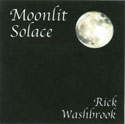 Moonlit Solace – Rick Washbrook (www.washbrookmusic.com): The latest disc from local guitarist Rick Washbrook is an eclectic offering. This solo effort showcasing his bluesy finger-style steel and nylon string picking, with and without gravely voice, features a number of original compositions along with eccentric vocal takes on My Funny Valentine and Fulsom Prison Blues and extended instrumental interpretations of Moon River and Summertime. Of particular note among the originals is the moving You’re Not Alone and the introspective instrumental title track.
Moonlit Solace – Rick Washbrook (www.washbrookmusic.com): The latest disc from local guitarist Rick Washbrook is an eclectic offering. This solo effort showcasing his bluesy finger-style steel and nylon string picking, with and without gravely voice, features a number of original compositions along with eccentric vocal takes on My Funny Valentine and Fulsom Prison Blues and extended instrumental interpretations of Moon River and Summertime. Of particular note among the originals is the moving You’re Not Alone and the introspective instrumental title track.
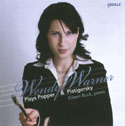 Wendy Warner Plays Popper and Piatigorsky – Wendy Warner; Eileen Buck (Cedille CDR 90000 111): As a student of the cello I became more than familiar with David Popper’s “High School of Cello Playing”, a set of 40 etudes designed to develop all the fundamental techniques required for mastering the music of the late 19th century. It surprises me now, some thirty years after struggling through those exercises, that I did not realize that Popper was also the composer of some lovely music. American Wendy Warner, a protégé of Rostropovich who went on to win first prize at the 1990 International Rostropovich Competition in Paris, presents us with three sets of pieces by Popper including a fully developed Suite for Cello and Piano lasting nearly half an hour. 20th century virtuoso cellist Gregor Piatigorsky was also an important teacher among whose students was notable Canadian Denis Brott. Piatigorsky is represented here by an intriguing set of variations on that familiar theme of Paganini. Each of the fourteen variations is inspired by another great string player – Pablo Casals, Joseph Szigeti, Yehudi Menuhin, Fritz Kreisler and Piatigorsky himself among others – culminating with a Tempo di Marcia dedicated to Vladimir Horowitz. These virtuosic portraits are performed with fiery panache by Warner and her able accompanist Eileen Buck. Fasten your seat belt for a hair-raising ride!
Wendy Warner Plays Popper and Piatigorsky – Wendy Warner; Eileen Buck (Cedille CDR 90000 111): As a student of the cello I became more than familiar with David Popper’s “High School of Cello Playing”, a set of 40 etudes designed to develop all the fundamental techniques required for mastering the music of the late 19th century. It surprises me now, some thirty years after struggling through those exercises, that I did not realize that Popper was also the composer of some lovely music. American Wendy Warner, a protégé of Rostropovich who went on to win first prize at the 1990 International Rostropovich Competition in Paris, presents us with three sets of pieces by Popper including a fully developed Suite for Cello and Piano lasting nearly half an hour. 20th century virtuoso cellist Gregor Piatigorsky was also an important teacher among whose students was notable Canadian Denis Brott. Piatigorsky is represented here by an intriguing set of variations on that familiar theme of Paganini. Each of the fourteen variations is inspired by another great string player – Pablo Casals, Joseph Szigeti, Yehudi Menuhin, Fritz Kreisler and Piatigorsky himself among others – culminating with a Tempo di Marcia dedicated to Vladimir Horowitz. These virtuosic portraits are performed with fiery panache by Warner and her able accompanist Eileen Buck. Fasten your seat belt for a hair-raising ride!
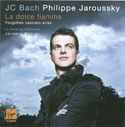 JC Bach, La dolce fiamma – Philippe Jaroussky; Le Cercle de l’Harmonie; Jérémie Rhorer (Virgin Classics 5099969456404): Elsewhere in this issue you will find a review of Cecilia Bartoli’s latest release “Sacrificium”, a collection of arias written for castrated male sopranos in the 17th and 18th centuries. This follows on last month’s release of a similar collection of castrati arias by Porpora sung by Karina Gauvin, also reviewed in these pages. Lest we think that this repertoire is now only the domain of female singers, French sopranist/countertenor Philippe Jaroussky has thrown his hat into the ring with a collection of “forgotten castrato arias” by Johann Christian, youngest son of Johann Sebastian and Anna Magdalena Bach. I must say I am a bit surprised to learn that the barbaric practice persisted so long into the 18th century, with the latest work included here a concert aria dating from 1779. Be that as it may, this is wonderfully lyrical and dramatic music superbly sung by the young Jaroussky. The period orchestra is fine form under Rhorer’s direction and the sound is immaculate.
JC Bach, La dolce fiamma – Philippe Jaroussky; Le Cercle de l’Harmonie; Jérémie Rhorer (Virgin Classics 5099969456404): Elsewhere in this issue you will find a review of Cecilia Bartoli’s latest release “Sacrificium”, a collection of arias written for castrated male sopranos in the 17th and 18th centuries. This follows on last month’s release of a similar collection of castrati arias by Porpora sung by Karina Gauvin, also reviewed in these pages. Lest we think that this repertoire is now only the domain of female singers, French sopranist/countertenor Philippe Jaroussky has thrown his hat into the ring with a collection of “forgotten castrato arias” by Johann Christian, youngest son of Johann Sebastian and Anna Magdalena Bach. I must say I am a bit surprised to learn that the barbaric practice persisted so long into the 18th century, with the latest work included here a concert aria dating from 1779. Be that as it may, this is wonderfully lyrical and dramatic music superbly sung by the young Jaroussky. The period orchestra is fine form under Rhorer’s direction and the sound is immaculate.
We welcome your feedback and invite submissions. CDs and comments should be sent to: The WholeNote, 503 – 720 Bathurst St. Toronto ON M5S 2R4.
David Olds
DISCoveries Editor
discoveries@thewholenote.com


